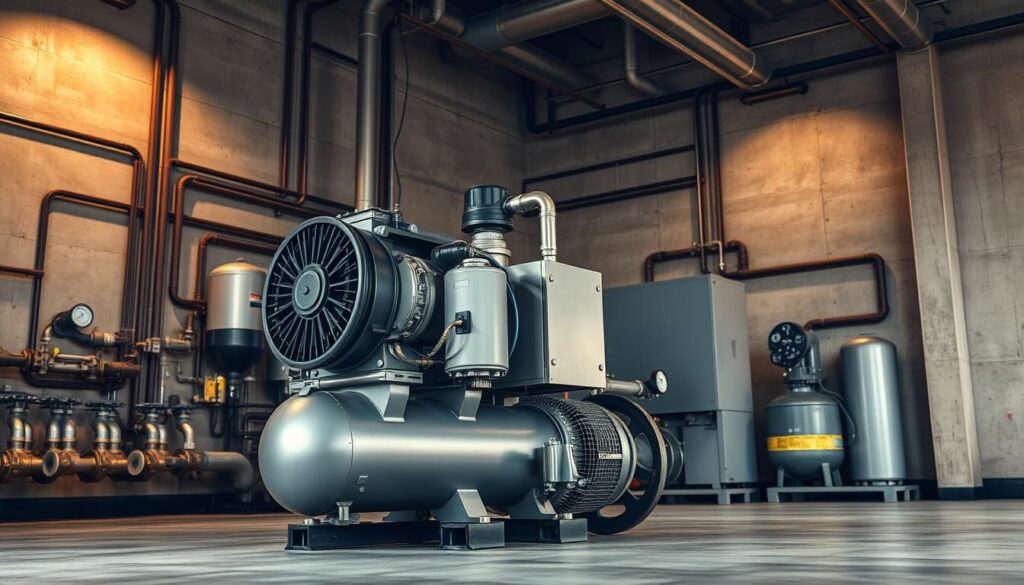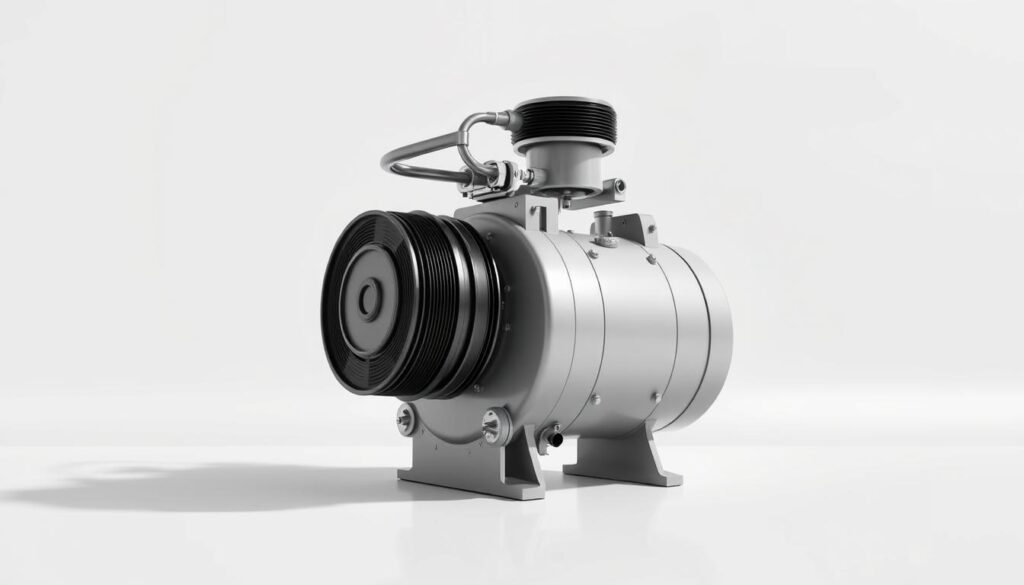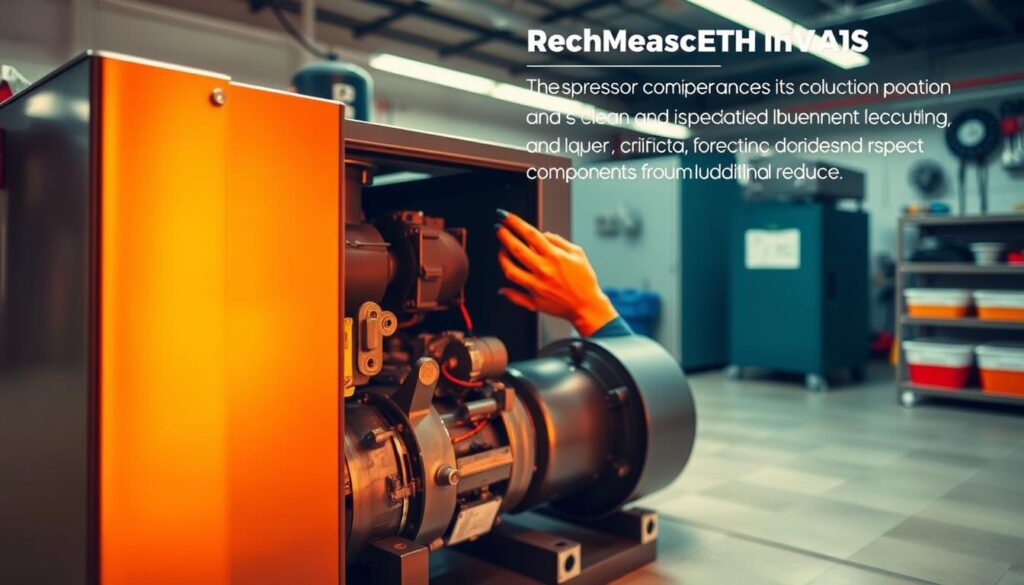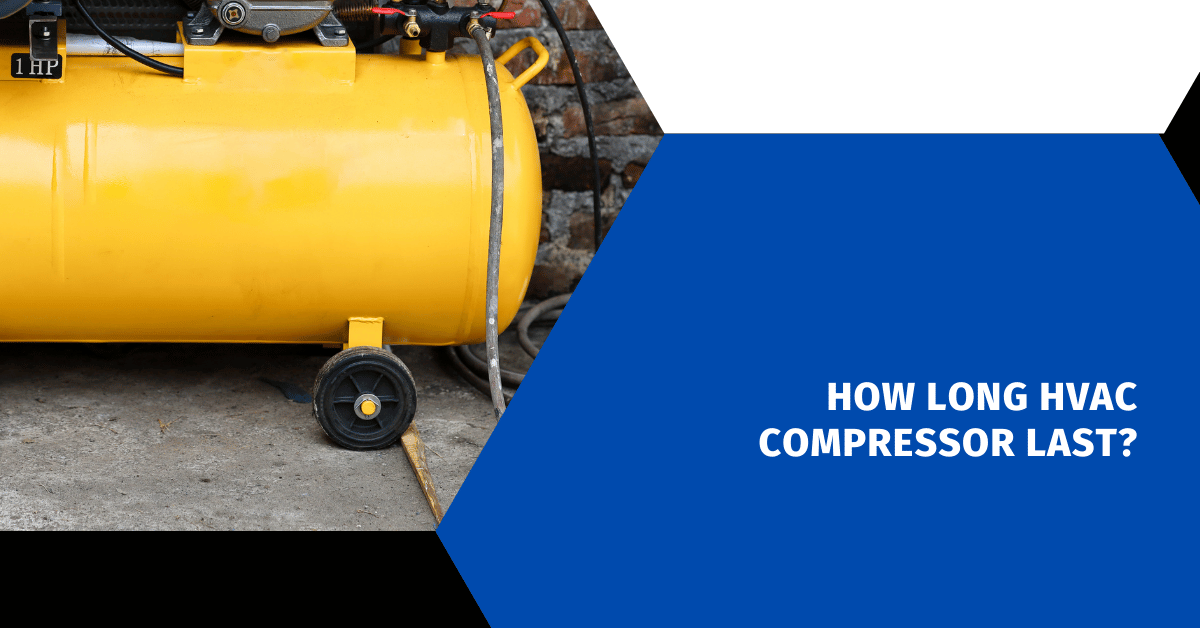Affiliate Disclosure
HVAC Guide Guys is a participant in the Amazon Services LLC Associates Program, an affiliate advertising program designed to provide a means for sites to earn advertising fees by advertising and linking to Amazon.
How Long HVAC Compressor Last? Ever thought about how long your HVAC system’s heart—the compressor—will keep your home cool? Knowing how long an HVAC compressor lasts can save you a lot of money. It also helps you plan for when you might need a new one.

Most HVAC compressors last between 10 to 15 years if you take good care of them. How long they last depends on a few important things. These include how well you maintain them, how often you use them, and the environment they’re in.
Your air conditioning system is a big investment. Knowing when and how to take care of your compressor can make it last longer. This ensures your home stays cool and comfortable, even in the hottest summers.
Key Takeaways
- Average HVAC compressor lifespan ranges from 10-15 years
- Regular maintenance significantly extends compressor performance
- Environmental factors impact compressor durability
- Professional inspections help prevent unexpected breakdowns
- Proactive maintenance is more cost-effective than emergency replacements
Table of Contents
Understanding HVAC Compressor Basics and Function
Your home’s air conditioning system has a key part that affects its cooling power: the compressor. This part is vital for making your home cool and comfortable.
The Crucial Role of Compressors in Cooling
Compressors are the heart of air conditioning systems. They do several important jobs:
- Removing heat from indoor air
- Circulating refrigerant through the cooling system
- Maintaining optimal temperature and humidity levels
Key Components That Impact Compressor Performance
Knowing how an HVAC compressor works shows its importance. The main parts are:
- Motor: Drives the compression mechanism
- Refrigerant Pump: Moves cooling agents through the system
- Electrical Connections: Provide power and control
“A well-maintained compressor is the key to efficient home cooling and long-term HVAC performance.”
How Compressors Contribute to Home Cooling
Your compressor works hard to take heat out of indoor air. It makes warm air cool and comfortable. By compressing and moving refrigerant, it keeps your home at a good temperature.
With regular care, your HVAC compressor can work well for 10-15 years. This means your home stays cool and uses less energy.
Explore Our HVAC Shop
Looking for top-rated HVAC tools, parts, and accessories? Visit our shop and find the perfect solution for your needs.
Visit the ShopAverage Lifespan of HVAC Compressors
Knowing how long an HVAC compressor lasts is key for homeowners. It helps them plan for maintenance and possible replacements. Most compressors last between 10 to 15 years. This makes them a big part of your home’s comfort system.
The lifespan of your HVAC compressor depends on a few things:
- Quality of initial installation
- How often you get professional maintenance
- Your local climate
- How you use it
Proper care can make your compressor last longer. Experts say to get professional maintenance at least once a year. Regular check-ups can spot problems early, saving you from big repair costs.
Watch for signs that your compressor might be getting old:
- Higher energy bills
- Cooling not working as well
- Strange noises when it runs
- It keeps turning on and off a lot
If your AC is getting close to 10 years old, start thinking about replacing it. Some compressors can last up to 15 years, but many start to wear out after 10. Getting regular maintenance can keep your system running well and last longer.
Explore Our HVAC Shop
Looking for top-rated HVAC tools, parts, and accessories? Visit our shop and find the perfect solution for your needs.
Visit the ShopFactors That Impact Compressor Longevity
Your HVAC compressor’s lifespan depends on many important factors. Knowing these can help you keep your system running well for a long time.
Several key elements directly influence how long your HVAC compressor will function optimally:
Maintenance Frequency and Quality
Regular maintenance is key to a longer compressor life. Studies show that routine professional tune-ups can:
- Increase lifespan by up to 25%
- Improve energy efficiency by 10%
- Reduce repair costs
- Prevent unexpected system failures
Usage Patterns and Climate Conditions
Your HVAC system’s environment greatly affects its compressor. Extreme temperatures and constant use can shorten its life.
- Extreme outdoor temperatures can cause compressors to run 50% longer
- Continuous high-setting operation may reduce lifespan by approximately 15%
- Well-insulated homes can reduce compressor runtime by 30%
Installation Quality and Unit Sizing
Proper installation is vital for compressor performance. Wrong sizing or poor installation can cause early wear and lower efficiency.
- Professional installation can decrease failure risk by up to 30%
- Correct unit sizing can extend compressor life by 20%
- Mismatched components can reduce system efficiency by 15%
By understanding and managing these factors, you can ensure your HVAC system works efficiently for years.
Explore Our HVAC Shop
Looking for top-rated HVAC tools, parts, and accessories? Visit our shop and find the perfect solution for your needs.
Visit the ShopHow Long HVAC Compressor Last: A Comprehensive Guide

Knowing how long HVAC compressors last is key for homeowners. It helps keep your system running well and efficiently. Usually, an AC compressor works great for 10 to 15 years. But, top models might last longer with the right care.
To make your compressor last longer, follow these steps:
- Do regular maintenance checks
- Clean coils and filters often
- Keep an eye on refrigerant levels
- Fix problems quickly
How well you maintain your compressor really matters. Experts say get your system checked by pros every year. This helps find and fix issues before they get worse.
| Maintenance Factor | Impact on Compressor Lifespan |
|---|---|
| Annual Professional Inspection | Can extend lifespan by up to 50% |
| Regular Cleaning | Reduces wear and improves efficiency |
| Timely Repairs | Prevents major system failures |
Warning signs of compressor wear include reduced cooling efficiency, unusual noises, and frequent circuit breaker trips. Catching these early can save you significant repair costs.
“Proactive maintenance is the key to maximizing your HVAC compressor’s durability and performance.” – HVAC Maintenance Experts
By taking good care of your compressor, you can make it last longer than usual. This means better comfort and energy savings in your home.
Common Signs of a Failing Compressor
Your HVAC compressor is key to your air conditioning system. Spotting signs of a failing compressor can save you from costly repairs and breakdowns. Knowing these warning signs helps you keep your cooling system in top shape.
Spotting a failing HVAC compressor early can save you from expensive fixes. It ensures your home stays cool during hot summer months. About 30% of air conditioning service calls are due to compressor problems, so it’s important to stay alert.
Unusual Noises and Vibrations
Loud or strange noises are big warning signs of a failing HVAC compressor. These sounds can mean serious internal issues:
- Clicking or rattling sounds during startup
- Persistent humming or buzzing
- Grinding or screeching noises
Electrical problems cause about 25% of compressor failures, often with distinct sounds. Turning off your AC immediately when hearing unusual noises can prevent further damage.
Performance Issues and Energy Efficiency Decline
A struggling compressor affects your system’s performance:
- Reduced airflow (reported by 40% of homeowners)
- Weak or inconsistent cooling
- Increased electricity bills (potentially 20% higher)
Physical Signs of Wear and Damage
Visual and operational signs can show how your compressor is doing:
| Physical Sign | Potential Issue |
|---|---|
| Refrigerant leaks | Occur in approximately 10% of HVAC systems |
| Frequent circuit breaker tripping | Indicates possible electrical shorts |
| Compressor fails to start | Happens in about 5% of cooling system issues |
About 15% of homeowners might not notice failing compressor signs until damage is done. Regular maintenance and quick action to these warning signs can extend your HVAC system’s life and prevent unexpected breakdowns.
Explore Our HVAC Shop
Looking for top-rated HVAC tools, parts, and accessories? Visit our shop and find the perfect solution for your needs.
Visit the ShopEssential Maintenance Tips for Extended Compressor Life

Keeping your HVAC compressor in good shape is key. It prevents damage and keeps it running smoothly. Regular care can make your system last longer and save you money on repairs.
Good HVAC compressor care involves a few important steps:
- Replace air filters every three months to prevent system stress
- Schedule professional inspections annually
- Keep surrounding areas clean and free from debris
- Monitor refrigerant levels carefully
- Check condenser unit performance regularly
Keeping air filters clean is vital for your compressor. Dirty filters make your system work too hard. This can cut efficiency by up to 15%. Regularly checking and cleaning filters helps avoid airflow problems that can damage your compressor.
Experts suggest a thorough maintenance routine. This includes:
- Cleaning evaporator and condenser coils
- Testing refrigerant charge
- Checking electrical connections
- Lubricating moving parts
- Measuring system airflow
Regular maintenance can add 5-10 years to your HVAC compressor’s life. These tips help protect your equipment and keep it running efficiently.
Explore Our HVAC Shop
Looking for top-rated HVAC tools, parts, and accessories? Visit our shop and find the perfect solution for your needs.
Visit the ShopWhen to Repair vs. Replace Your Compressor
Choosing between repairing or replacing your HVAC compressor is tough. It’s a big decision that affects your comfort and your budget.
Cost Comparison Analysis
Looking at replacement options, think about the money involved. Replacing an AC compressor costs about $1,600. A whole outdoor unit replacement can be $1,800. Here are some financial points to consider:
- Current repair costs
- Age of the existing system
- Potential future repair expenses
- Energy efficiency of the current unit
Age and Efficiency Considerations
HVAC compressors usually last 10 to 15 years. If your unit is getting close to that age, it’s time to think about replacing it. Older units often:
- Use more energy
- Need repairs more often
- Don’t cool as well
Warranty Coverage Factors
Warranty coverage is key in deciding to replace. Trane and Carrier offer warranties that can help with costs. Here’s what to look at:
- Current warranty status
- Manufacturer’s replacement policy
- Comprehensive system coverage
- Remaining warranty period
Pro Tip: If your unit is less than 10 years old and under warranty, repair might be the most cost-effective option.
Choosing to repair or replace depends on your specific situation. Talking to a professional HVAC technician can help. They can give advice that fits your home’s needs.
The Role of Professional HVAC Services
Professional HVAC services are key to keeping your system running well and your compressor lasting longer. Licensed technicians use special maintenance tips to avoid expensive fixes and sudden breakdowns. They suggest getting a professional check-up every year to catch problems early.
Your HVAC system needs special care because of its complex parts and high-voltage risks. Certified techs know how to fix compressors and do detailed checks that homeowners can’t do. They clean important parts, check refrigerant levels, and check how well your system works with special tools.
Getting professional help can make your compressor last up to 15 years, saving you a lot of money. These experts give you maintenance tips that fit your system, climate, and how you use it. This ensures your system works its best and uses less energy.
When picking a service, look for licensed and experienced HVAC techs who offer full maintenance plans. Their knowledge helps avoid sudden failures and helps you decide on repairs or upgrades based on your system’s condition.

